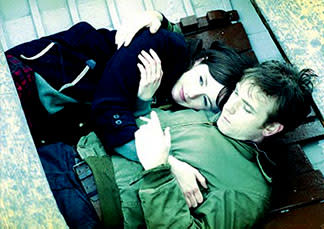David Mackenzie's adaptation of this Alexander Trocchi novel fragments a year in the life of Joe (Ewan McGregor), a failing writer supported by Cathie (a scene-stealing Emily Mortimer) in 1960s Scotland. His journey begins when he runs away from Cathie, throwing his typewriter into the river and joining a small barge that operates through the canals between Edinburgh and Glasgow. Before long both Joe and the elder boat operator Les (a solid The Magdelene Sisters' director Peter Mullan) come across a dead Cathie in the water and soon Joe's past returns to reveal his role in her death, all while the papers pick up a false lead and the courts charge her plumber, a suspected lover, with the murder. In the meantime, Joe breaks up the barge's family by consummating an affair with Ella (Tilda Swinton), the much younger wife of the functional yet gambling Les, then gets nasty with her recently gratefully widowed sister and finally runs away to a boarding house where he shags his boarder's wife. Eventually Joe, Les and Ella are brought together as witnesses in the crowd at the trial for Cathie's plumber lover and a tortured Joe's best effort at resolving his inner demons is to admit his presence at her accidental death by way of an unsigned letter.
The visuals, often pitting the lone barge driver against dark tunnels, murky water and foggy air, are striking, but even the presence of super-producer Jeremy Thomas (The Last Emperor, Crash) and a score by Talking Head David Byrne fail to help Joe connect at a basic human level. Even if being someone like Joe in that era did guarantee ease of access to masses of sexually repressed wives waiting for liberation from their poor and pathetic daily existence, the impersonal, unaffecting nature of his jaunts thoroughly degrade the female characters and suggests that while in Trocchi's representation this particular society was eager to rectify and equate social misconducts with lust, Mackenzie's vision of an anti-hero Joe is simply self-indulgent. (Mongrel Media)
The visuals, often pitting the lone barge driver against dark tunnels, murky water and foggy air, are striking, but even the presence of super-producer Jeremy Thomas (The Last Emperor, Crash) and a score by Talking Head David Byrne fail to help Joe connect at a basic human level. Even if being someone like Joe in that era did guarantee ease of access to masses of sexually repressed wives waiting for liberation from their poor and pathetic daily existence, the impersonal, unaffecting nature of his jaunts thoroughly degrade the female characters and suggests that while in Trocchi's representation this particular society was eager to rectify and equate social misconducts with lust, Mackenzie's vision of an anti-hero Joe is simply self-indulgent. (Mongrel Media)
